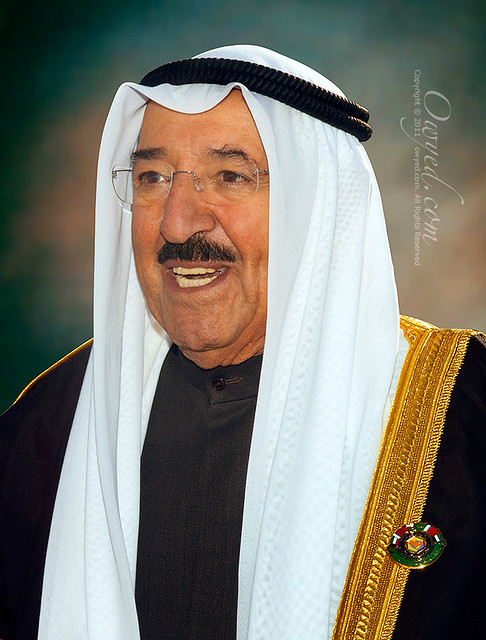With the passing away of Sheikh Sabah Al-Ahmad Al-Jaber Al-Sabah, diplomacy has undoubtedly lost a prominent figure. Today, everyone expects that talking about the late Sheikh Sabah Al-Ahmad in the African Memory will lead me to highlight the Kuwaiti-African relations. This is not true as I dealt with these relations in various studies available in the Gulf and African press for those interested, but my point today will be different and concise.
During my stay in the African continent which lasted for ten years, I got to recognize the diplomacy of the late Sheikh Sabah Al-Ahmad through two events: The first event was told to me by the late thinker Dr. Mansour Khalid during our meeting at his home in Khartoum in 2016, while I was an eyewitness to the second in April 2012.
I met the late thinker and writer Dr. Mansour Khalid three times in my life. The first was arranged with the Sudanese Republican Palace during the Salvation Regime government; the second and third meetings were the result of personal effort. I remember asking him about the reason behind the strained Sudanese-Libyan relations and why they reached such a level of deterioration since the time of the late President Jaafar al-Nimeiri and until the time of President Omar al-Bashir? He told me that he was attending an international meeting in New York with the Libyan Foreign Minister at the time, Ali Treki, when Sheikh Sabah Al-Ahmad Al-Jaber Al-Sabah, the then-Kuwaiti Foreign Minister saw him. He approached them and asked them to accompany him to his residence where he said: “Since you are friends, why don’t you seek to achieve reconciliation between the Sudanese and Libyan leaderships?” So, each minister presented his point of view and the reasons behind the estrangement between their countries while Sheikh Sabah listened attentively. After they finished, he told them that they must start looking for solutions and that he is personally ready to arrange a meeting for the two parties at any level in Kuwait. Dr. Mansour added that they left Sheikh Sabah Al-Ahmad’s residence and both of them admiring his diplomatic initiative to clear the air between Khartoum and Tripoli. However, that initiative could not materialize due to the deteriorated Egyptian-Libyan relations as Cairo was unwilling to see an improvement in the relations between Khartoum and Tripoli. Dr. Mansour adds that it was only then he understood what Sheikh Sabah Al-Ahmad meant when he said “walls have ears”.
And whoever is interested in the particulars of that situation may look for the book entitled “Excerpts and Margins on a Biography” written by the late Dr. Mansour Khalid shortly before his death.
The second event was in April 2012 when the government of the Kingdom of Eswatini (formerly Swaziland) claimed that the State of Kuwait donated a luxury plane worth 46 million dollars to King Mswati III. The Swazi government resorted to such a claim after popular protests escalated following rumors that the plane was purchased from taxpayers’ money amid the worst economic crisis witnessed in the history of the country. However, documents presented before the Canadian courts revealed that the Swazi Prime Minister, Barnabas Dlamini, was dishonest when he announced that King Mswati’s III private jet was a gift from the State of Kuwait. Later, it was proved that the plane was bought with a down payment and the King had used it for some time but due to default in the remainder payment the Kuwaiti diplomacy interfered lest the Kingdom of Eswatini further suffer from the severe economic crisis, especially with the popular protests escalating.
Following that incident, relations between the State of Kuwait and the Kingdom of Eswatini strengthened, especially since the former is one of the first partner countries in the so-called regional centers scattered in Africa and which form part of the fund’s capacity-building initiative in the continent. During the reign of the late Sheikh Sabah Al-Ahmad, the State of Kuwait became partner in the Assistance Center headquartered in Mauritius, and partner in the second African Regional Technical Assistance Center in West Africa (AFRITAC West 2) which was opened in the Ghanaian capital, Accra, in 2013. In addition, the State of Kuwait is a partner in the Regional Technical Assistance Center for Central Africa in the Gabonese capital, Libreville, which was inaugurated in 2007.
The State of Kuwait partnership in those key regional centers in Africa was preceded by its partnership in the first Regional Technical Assistance Center for West Africa (AFRITAC West) which was inaugurated in Abidjan in 2003, besides its partnership in the Regional Technical Assistance Center for East Africa (AFRITAC East) which was inaugurated in 2002 in Tanzania.
The third event: In 2003, South Africa opposed the US intervention in Iraq to topple the Iraqi Regime, a position that was considered by the State of Kuwait a support of Saddam Hussein’s regime and which led to the deterioration of the Kuwaiti-South African relations. However, the Kuwaiti diplomacy handled that issue with much experience and wisdom when the late Sheikh Sabah Al-Ahmad directed The Kuwaiti Ministry of Foreign Affairs not to escalate the dispute with South Africa. Afterwards, the South African Ministry of Foreign Affairs responded by sending the Deputy Minister of Foreign Affairs at the time Aziz Pahad, followed by the visit of the Chief of the South African National Defence Force, in addition to the visit of South Africa’s Minister of Foreign Affairs Nkosazana Dlamini Zuma. The African officials then stressed the importance of the Kuwaiti-South African relations.
As a researcher in the Afro-Gulf relations, I attribute the South African move that aimed at containing the dispute before it turns into a diplomatic crisis to the importance of the State of Kuwait in the South African strategy. The State of Kuwait was among the first Gulf and Arab States to have contributed to the promotion of tourism industry in South Africa. This is demonstrated in the support provided to Zimbali Resort located in the South African region of KwaZulu-Natal by The Kuwaiti International Financial Advisors Company (IFA), making it one of the largest foreign capitals contributing to the South African tourism industry to date.
Sheikh Sabah Al-Ahmad passed away and left a huge humanitarian and diplomatic legacy the African generations will never forget.


No Comments